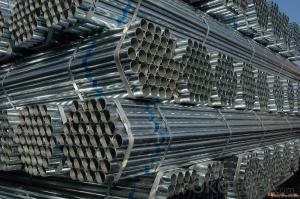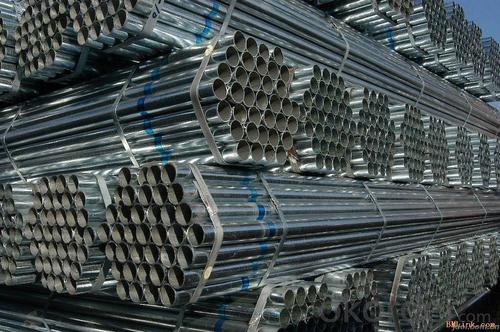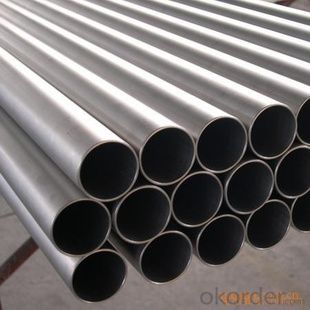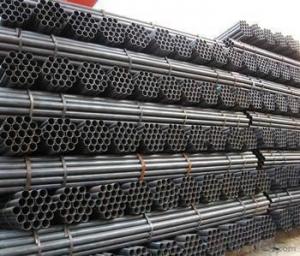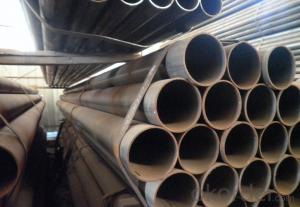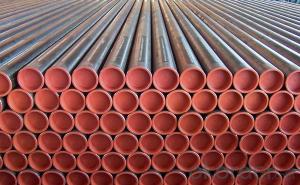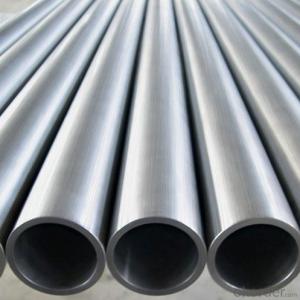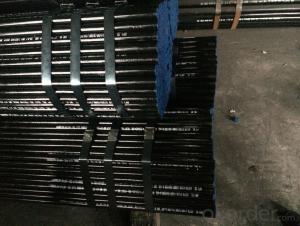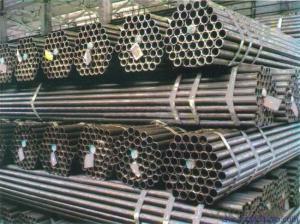Welded Black ERW Steel Pipe Water Pipe Oil Pipe
- Loading Port:
- China main port
- Payment Terms:
- TT OR LC
- Min Order Qty:
- 25 m.t.
- Supply Capability:
- 6000 m.t./month
OKorder Service Pledge
OKorder Financial Service
You Might Also Like
1、Structure of Welded ERW Steel Pipe API 5L:
API 5L ERW steel pipe is electric resistance welding, the abbreviation for ERW for transporting oil and natural gas vapor liquid objects, can meet the requirements of high and low pressure, the transport in the world with pipe sector accounted for a pivotal position.
2、Main Features of Welded Black ERW Steel Pipe API 5L:
• High manufacturing accuracy
• High strength
• Good visual effect
• Reasonable price
• Small inertia resistance
• Strong heat dissipation ability
3、Welded Black ERW Steel Pipe Specification API 5L:
Standard | GB, DIN, ASTM ASTM A106-2006, ASTM A53-2007 |
Grade | 10#-45#, 16Mn 10#, 20#, 45#, 16Mn |
Thickness | 1 - 33 mm |
Section Shape | Round |
Outer Diameter | 21 - 610mm |
Place of Origin | Tianjin, China (Mainland) |
Secondary Or Not | Non-secondary |
Application | Hydraulic Pipe |
Technique | Cold Drawn |
Certification | API |
Surface Treatment | factory state or painted black |
Special Pipe | API Pipe |
Alloy Or Not | Non-alloy |
Length | 5-12M |
Outer Diameter | 21.3-610mm |
Grade | 20#, 45#, Q345, API J55, API K55, API L80, API N80, API P110, A53B |
Standard | ASME, ASTM |
1) Material:20#(ASTM A 106/A53 GRB.API5LGRB,GB),45#,16Mn,10#.
2) Specification range:OD:21.3-610mm,WT:6-70mm,length:6-12m or according to the requirement of clients.
3) Excutive standards:GB,ASME API5L.ASTM A 106/A53,Despite of the above standards,we can also supply seamless steel pipe with standard of DIN,JIS,and so on,and also develop new products according to the requirements of our clients!
4) Surface:black lacquered,varnish coating or galvanized.
5) Ends:Beveled or square cut,plastic capped,painted.
6) Packing:bundles wrapped with strong steel strip,seaworthy packing.
4、Packaging & Delivery
Packaging Details: | seaworthy package,bundles wrapped with strong steel strip |
Delivery Detail: | 15-30days after received 30%TT |
5、FAQ of Welded Black ERW Steel Pipe API 5L:
①How is the quality of your products?
Our products are manufactured strictly according to national and internaional standard, and we take a test
on every pipe before delivered out. If you want see our quality certifications and all kinds of testing report, please just ask us for it.
Guaranteed: If products’ quality don’t accord to discription as we give or the promise before you place order, we promise 100% refund.
②How about price?
Yes, we are factory and be able to give you lowest price below market one, and we have a policy that “ for saving time and absolutely honest business attitude, we quote as lowest as possible for any customer, and discount can be given according to quantity”,if you like bargain and factory price is not low enough as you think, just don’t waste your time.Please trust the quotation we would give you, it is professional one.
③Why should you chose us?
Chose happens because of quality, then price, We can give you both.Additionally, we can also offer professional products inquiry, products knowledge train(for agents), smooth goods delivery, exellent customer solution proposals.Our service formula: good quality+good price+good service=customer’s trust
SGS test is available, customer inspection before shipping is welcome, third party inspection is no problem.
6、 Welded Black ERW Steel Pipe Images API 5L:
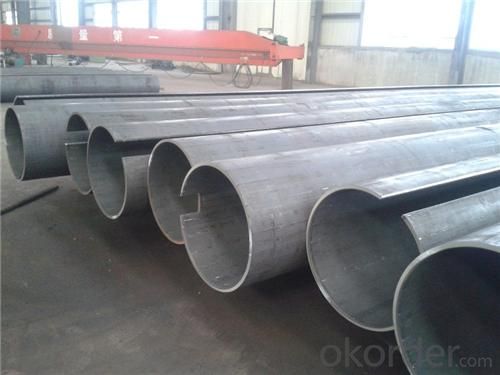
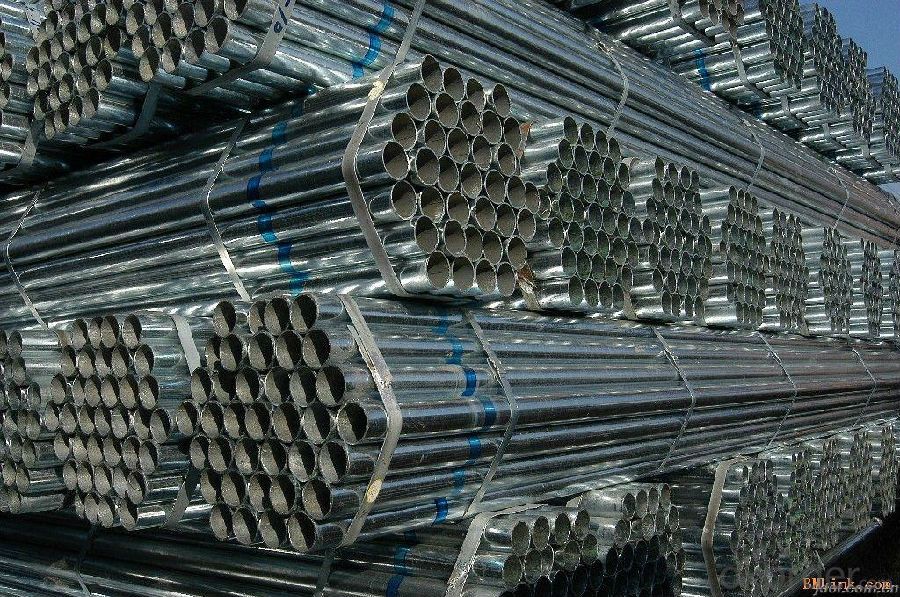
- Q: Can steel pipes be used for underground applications?
- Yes, steel pipes can be used for underground applications. They are commonly used for various purposes such as water and sewage systems, natural gas and oil pipelines, and underground infrastructure projects. Steel pipes are durable, strong, and resistant to corrosion, making them suitable for underground environments.
- Q: How much is the wall thickness standard of building 48?
- According to the "construction of fastener type steel pipe scaffold safety technical specifications JGJ130-2011" stipulates that the specification of steel pipe should be Phi 48.3 * 3.6, that is, wall thickness is 3.6mm.
- Q: How are steel pipes used in the construction of natural gas power plants?
- Steel pipes are used in the construction of natural gas power plants for various purposes such as transporting natural gas from the source to the plant, distributing gas within the facility, and carrying exhaust gases away from the plant. They are essential for maintaining a safe and efficient flow of natural gas throughout the power plant's infrastructure.
- Q: What is the size of seamless steel tube DN150?
- Seamless steel pipe having a hollow cross section, used as a conduit for conveying fluids, such as pipelines for transporting petroleum, natural gas, gas, water, and certain solid materials. Compared withsteel and roundsteelinsolid, flexural torsional strength in the same time, the weight is light, is a kind of economic section steel, widely used in the manufacture of structural parts and mechanical parts, such as the oil pipe, automobile transmission shaft, the bicycle frame and steel construction with scaffold with steel pipe manufacturing ring parts can be improved the utilization rate of materials, simplify the manufacturing process, material saving and working hours, has been widely used to manufacture steel tube.
- Q: Are steel pipes suitable for underground gas lines?
- Yes, steel pipes are suitable for underground gas lines. They are commonly used due to their strength, durability, and resistance to corrosion, making them a reliable choice for transporting and distributing gas underground.
- Q: Can steel pipes be used for underground water supply networks?
- Steel pipes are a viable option for underground water supply networks; they possess qualities such as durability, strength, and corrosion resistance. These pipes are commonly employed due to their ability to endure high pressure and bear the weight of the soil and other external forces. Furthermore, steel pipes come in a range of sizes and can be easily welded, making them suitable for diverse water supply system needs. Nevertheless, it is crucial to consider factors like soil quality, the presence of corrosive substances or chemicals, and the necessity of routine maintenance to guarantee the long-lasting effectiveness of steel pipes in underground water supply networks.
- Q: What is the difference between steel pipes and fiberglass pipes?
- The main difference between steel pipes and fiberglass pipes lies in their composition and properties. Steel pipes are made of metal and are known for their strength, durability, and resistance to high temperatures and pressure. They are commonly used in industrial settings and for transporting liquids and gases. On the other hand, fiberglass pipes are made of glass fibers embedded in a resin matrix, providing them with excellent corrosion resistance, lightweight properties, and insulation capabilities. Fiberglass pipes are often used in applications where corrosion is a concern, such as in chemical processing plants or wastewater treatment facilities.
- Q: What are the different types of steel pipe coatings for chemical processing plants?
- There are several types of steel pipe coatings commonly used in chemical processing plants, including epoxy, polyethylene, polyurethane, and fusion-bonded epoxy (FBE) coatings. Each coating offers different benefits such as corrosion resistance, chemical resistance, and enhanced durability, which are crucial for protecting steel pipes against the harsh conditions and corrosive substances found in chemical processing plants.
- Q: Are steel pipes suitable for underground irrigation systems?
- Yes, steel pipes can be suitable for underground irrigation systems. Steel pipes are known for their durability and strength, making them resistant to corrosion and able to withstand high pressure. They are also less likely to crack or break under the ground's weight or pressure. Additionally, steel pipes have a long lifespan, reducing the need for frequent replacements. However, it is important to consider the type of water being transported, as certain minerals or chemicals in the water can cause corrosion over time. In such cases, it may be necessary to use corrosion-resistant coatings or liners. Overall, steel pipes are a reliable choice for underground irrigation systems, especially in areas with high water pressure or where durability is a priority.
- Q: How are steel pipes used in the chemical processing industry?
- Steel pipes are commonly used in the chemical processing industry for various purposes such as transporting chemicals, gases, and liquids, as well as for structural support and containment. They are highly durable, corrosion-resistant, and can withstand high temperatures and pressures, making them ideal for handling and conveying hazardous substances safely.
Send your message to us
Welded Black ERW Steel Pipe Water Pipe Oil Pipe
- Loading Port:
- China main port
- Payment Terms:
- TT OR LC
- Min Order Qty:
- 25 m.t.
- Supply Capability:
- 6000 m.t./month
OKorder Service Pledge
OKorder Financial Service
Similar products
Hot products
Hot Searches
Related keywords
